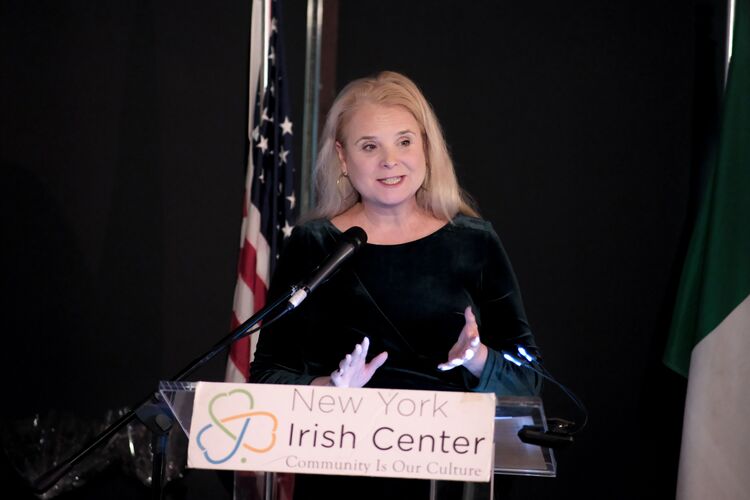“It’s like going over to your aunt’s house.”
That’s the effect the owners and staff at Browne’s Irish Marketplace at 3300 Pennsylvania Ave., Kansas City, are aiming for.
And they’ve succeeded, if it’s an aunt that offers a warm welcome, a drink and freshly-made nourishment, advice about things pertaining to Ireland and maybe even a singsong. They’ve certainly had enough practice over a span of 137 years. The family business began as a grocery store that you walked to in the old neighborhood; now folks drive from Kansas, Iowa, Nebraska and Oklahoma to that corner of Missouri for their Irish goods.
Through its many decades, it’s had a liquor license – the oldest in Kansas City, some say, with those famous years from 1920 to 1933 being an interruption in name only.
And Browne’s was informed by official sources not long ago that it’s the oldest business in the same Irish family in North America.
But, wait! Civil servants in Dublin checked again and reported back that it is actually the oldest Irish family business outside of Ireland anywhere worldwide.
“That was during Covid and we couldn’t celebrate. But we’ve been celebrating since,” said co-owner Kerry Browne.
At one level, it’s a straightforward story of a proprietorship of four couples over four generations. Ed and Mary Flavin, immigrants from Listowel, Co. Kerry, established the business in 1887. They moved it a short distance to the current location in 1901.
Each of the next three generations was fortunate to have someone enthusiastic and hardworking marry in. The first of those spouses replaced the surname in Flavin Grocery with his own. He was James R. “Jim” Browne, who was from Knocknagoshel, Co. Kerry, and he wed one of the Flavins’ daughters, Margaret, in 1915. The pair took over the reins in 1917.
Marjorie Blake, who was born in St. Louis, Mo., to parents also from Kerry, became Jim and Margaret’s daughter-in-law, when she married James R. “Bob” Browne Jr., and they assumed ownership in 1955.
Finally, Kerry Browne, the youngest of Marjorie and Bob’s three daughters, partnered with John McClain to revive the business at the beginning of the 1980s after it had been closed for a couple of months.
Both of Kerry Browne’s parents had been battling illness and Bob died in 1981.
“It was a sad time,” McClain said. “Kerry’s dad had grown up in this place, one of 11 children.”
Browne’s Irish Marketplace owners Kerry Browne and John McClain, with staff member Kate Jones, right.
Marjorie, though, recovered. She participated energetically in the next chapter as Browne’s became more of a delicatessen and also a food service for big family events like weddings. She died in 2004. Kerry Browne still gets messages from people praising her mother, the matriarch for 50 years, saying things like, “She got me through my divorce.”
In the 21st century, Browne’s became well-known for its specialization in imported Irish goods. Its website says, “In Summer 2008, Browne’s expanded back to its original layout with an addition of six rooms of Irish and Celtic gifts.”
The owners’ two young adult sons help out, as do all the Browne nieces and nephews and grandnieces and grandnephews. “So, six generations are involved,” Kerry Browne said.
And there’s a new beginning, too, courtesy of the pandemic. They have a large park-like space at the back of the property, which they used only very occasionally. With the advent of social distancing and the national unleashing of innovative energies, they began to see the potential of what Browne described as a “plot of mud.”
“We decided to make it something,” she said.
They liked the idea, for instance, of Dublin-born musician Eddie Delahunt, long a local favorite, playing to larger open-air audiences.
“He’s spectacular,” Kerry Browne said. And there’s the inevitable connection to County Kerry. “He got his start in Dingle,” she added.
“We got carried away,” Browne said of their building a handsome new patio. “It’s really transformed the business.”
Browne’s patio out back is a recent addition.
An impressively tall catalpa tree in that back area dates from when the Flavins were living in the building with their six children in the first years of the 20th century.
“It was always a corner grocery store, but it grew and grew and grew,” John McClain said of Browne’s, adding that his wife’s grandparents worked from 6 to 6 behind the counter.
“It was quite an enterprise back then,” he said, “There were seven union butchers working in the back.”
The Browne’s Irish Marketplace website says Margaret Flavin Browne was “a fine businesswoman ahead of her time, [who] raised their 11 children and worked daily behind the counter.” Jim Browne, who immigrated in 1907 at age 22, is described “as a hail-fellow well met” who was involved in local politics and was one of the seven founding members of Associate Grocers (now AWG, which is in 15 states).
In the early hours of each morning, Browne made the journey to the heavily industrial West Bottoms neighborhood to select meat for that day.
“Kerry’s dad was driving a truck by the time he was 12. He’d pick up the produce for the day,” McClain said of Bob Browne, who was born in 1917 the year his parents took over the business.
By the early 1920s, the political faction associated with the Pendergast family, which had parental roots in County Tipperary and a local power base in the West Bottoms, emerged as dominant.
It considered Prohibition bad for business, and the political machine generally took a liberal attitude to gambling and alcohol. Kansas City nightlife flourished through the 1920s.
“Apparently our basement had some activity happening, we’ll say,” Kerry Browne said. “There’s an aroma that lingers. Wouldn’t you love to travel in time, to pop in and see how things are?”
The family business has been selling groceries for 137 years.
Then, bad times hit. Browne’s, according to the website, kept “the neighborhood alive during the Depression, letting people pay what they could.”
McClain, who was born and raised in Kansas City, Mo., said that in the Great Flood of 1951, “Kerry’s dad went around in a boat.”
He keeps track of the history of a business he took to working in straight away.
“I loved it,” he remembered. “I thought it was great.”
Of course, there had been a lot of changes and they had to adapt. The rise of the supermarket adversely affected the status of the larger grocery stores in Bob and Marjorie’s time. People were moving to the suburbs, but also specifically in their Midtown neighborhood homes were demolished to make way for the Penn Valley campus of Metropolitan Community College in 1969.
Still, people came back to shop, showing their loyalty to Browne’s, which had helped them in harder times.
In 2008, Browne’s expanded back to its original layout "with an addition of six rooms of Irish and Celtic gifts."
Now, the Midtown neighborhoods of Coleman Highlands and Valentine are experiencing a revival.
“It’s very exciting. Everybody wants to live here,” he said.
Through it all, Browne’s remains “very community-orientated still.”
It’s been particularly busy of late, so busy, as the Kansas City Irish get ready to celebrate the 50th anniversary of the St. Patrick’s Day Parade on Sunday, March 17, that Kerry Browne is thankful that it’s a leap year. That extra day in the calendar helps.
One calendar event arising out of the pandemic is the “travel night.” Browne, who had a particular childhood bond with her immigrant grandfather Jim (he died in 1970), and McClain, who has roots in the border area, have made more than 30 trips to Ireland and have gotten requests for advice.
They thought an open session, with everyone sharing, might be a good idea. And, indeed, it turned out to be that.
“Even people who’ve met at travel nights ended up traveling together,” Browne said. “Somebody can tell us about golfing or somebody else can talk about trains.”
Young immigrants might push for their home town or county, and often suggest good ideas that might never have occurred to Americans.
There’s also a demand, too, for advice about citizenship, and so Irish Consul General Robert Hull, Deputy Consul General Niamh Clarke and some others have been helpful in that regard.
“They’re wonderful people,” Browne said of the diplomatic staff who’ve traveled from Austin, Texas. “I call them all the time. They’re such a benefit to our community here.”
With a few days’ notice on social media, Browne’s can be packed with 100 people for their events, from recent immigrants to people who’ve never been to Ireland.
And then before the night is over, there’s a demand for more drinks and some songs.
“There’s a lot of energy in here,” Kerry Browne said.








